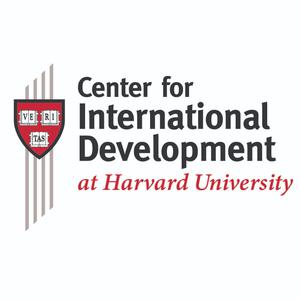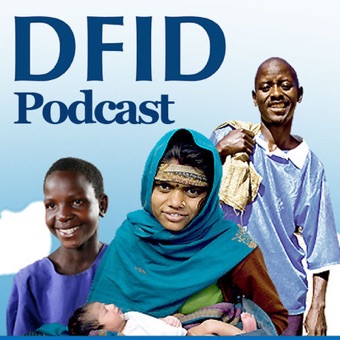
Development Policy Centre Podcast
Development Policy Centre, ANU
The Development Policy Centre is a think tank for aid and development policy based at the Crawford School of Public Policy at The Australian National University. We research and promote discussion of aid effectiveness, the Pacific and PNG, and development policy. Our events are a forum for the dissemination of findings and the exchange of new ideas. You can access audio recordings of our events through this podcast.
- 51 minutes 46 secondsMasood Ahmed on development cooperation in a contested world
Robin Davies speaks with Sir Masood Ahmed, the distinguished international economist whose career spans over 35 years at the forefront of international development.
Up to July 2024, Ahmed served as President of the US-based Center for Global Development for seven years, following influential roles at the International Monetary Fund, the World Bank and the UK's Department for International Development. Born in Pakistan and educated at the London School of Economics, Masood has been instrumental in shaping global economic policies, particularly in the areas of debt relief, aid effectiveness, and poverty reduction.
In this wide-ranging interview, Masood discusses the evolving landscape of development cooperation and the challenges facing the multilateral system. He addresses the pressing need to reform multilateral development banks, the complexities of climate finance, and the changing nature of official development assistance. Masood particularly emphasises the importance of rethinking how we approach international development funding, arguing for a clearer distinction between solidarity-based aid and spending on global public goods. He also explores the challenges of maintaining traditional development objectives in an era increasingly dominated by geopolitical considerations and competing priorities.
Masood delivered the Mitchell Oration at the 2024 Australasian AID Conference. Watch the full speech.Devpolicy Talks is the podcast of the Australian National University’s Development Policy Centre. Our producers are Robin Davies, Amita Monterola and Jackie Hanafie. You can read and subscribe to our daily blogs on aid, international development and the Pacific at devpolicy.org, and you can follow us on Facebook, LinkedIn, Instagram and Twitter.
You can send us feedback, and ideas for episodes too, to [email protected].
Read and subscribe to our daily blogs at devpolicy.org.
Learn more about our research and join our public events at devpolicy.anu.edu.au.
Follow us on Twitter, Facebook, LinkedIn and Instagram for latest updates on our blogs, research and events.
5 December 2024, 2:29 am - 41 minutes 5 secondsVaccinating the next billion: Gavi’s CEO Dr Sania Nishtar
Gavi is a unique global health partnership that has revolutionised access to vaccines in lower-income countries since 2000. Working with governments, UN agencies, private sector partners and civil society, Gavi has helped immunise more than one billion children, averted 18 million deaths and generating over US$200 billion in economic benefits. The organisation is known for its efficiency, keeping operational costs below 3%, and employs an innovative co-financing model where recipient countries gradually increase their contribution as their economic capacity grows, eventually becoming self-sustaining.
Gavi’s CEO Dr Sania Nishtar discusses the organisation’s evolving role in global health, from its traditional focus on childhood immunisation to new challenges in vaccine delivery post-COVID. Topics include the concerning rise in "zero-dose" children who haven't received any vaccines, Gavi's expanded mandate in emergency response and vaccine manufacturing, and its upcoming strategy for 2026-2030 which aims to vaccinate another billion children in half the time it took for the first billion. The conversation also explored Gavi's work in the Pacific region, particularly the challenges faced in places like Solomon Islands, and the organisation's upcoming replenishment campaign seeking $9 billion in funding.
Dr Nishtar is a cardiologist by training and has built an extraordinary career spanning medicine, civil society, and government. Before joining Gavi in March 2024, she served as a Senator in Pakistan and as Special Assistant to the Prime Minister on Poverty Alleviation, overseeing the implementation of Pakistan's largest social protection program, which reached around 15 million households. She founded Heartfile, an influential health policy think tank in Pakistan, and has chaired numerous high-level international commissions for organisations like WHO and the World Economic Forum. In 2017, she was one of three finalists for the position of WHO Director-General.
Devpolicy Talks is the podcast of the Australian National University’s Development Policy Centre. Our producers are Robin Davies, Amita Monterola, Jackie Hanafie and Finn Clarke.
Read and subscribe to our daily blogs at devpolicy.org.
Learn more about our research and join our public events at devpolicy.anu.edu.au.
Follow us on Twitter, Facebook, LinkedIn and Instagram for latest updates on our blogs, research and events.
22 November 2024, 12:40 am - 39 minutes 55 secondsClimate justice and the World Court: Cynthia Houniuhi
It’s the eve of COP29, the global climate change conference in Baku, Azerbaijan. In this episode, with thanks to the Australian Museum, we rebroadcast the 2024 Talbot Oration, delivered by Cynthia Houniuhi. You'll hear how a small group of committed Pacific law students transformed their classroom project into a global movement for climate justice, demonstrating the power of determined advocacy to shape international law and policy.
Cynthia Houniuhi has emerged as one of the Pacific's most compelling voices on climate justice. Growing up on the remote Reef Islands in the Solomons, Cynthia developed a profound connection to land and sea that would shape her future activism. She serves as president of Pacific Islands Students Fighting Climate Change, an organisation that began with just 27 law students at the University of South Pacific and has grown into a globally recognised advocacy group with members from every Pacific nation.
Her personal awakening to the climate crisis came through witnessing the gradual disappearance of Fanalei Island in South Malaita, where rising seas forced residents to abandon their homes. This led her to study law, specialising in environmental issues, and ultimately to help launch a groundbreaking campaign in 2019 seeking an advisory opinion from the International Court of Justice – the ICJ or the “World Court” – on nations’ climate protection obligations.
The campaign has achieved remarkable success. The United Nations General Assembly endorsed the initiative on 29 March 2023, with approximately 130 member states signing on to a resolution calling for the ICJ to consolidate and clarify the legal obligations of States to protect the climate system and to outline the legal consequences for causing harm to member states. The ICJ is expected to deliver its first-ever opinion on climate change responsibilities in the coming months.
Devpolicy Talks is the podcast of the Australian National University’s Development Policy Centre. Our producers are Robin Davies, Amita Monterola, Jackie Hanafie and Finn Clarke.Read and subscribe to our daily blogs at devpolicy.org.
Learn more about our research and join our public events at devpolicy.anu.edu.au.
Follow us on Twitter, Facebook, LinkedIn and Instagram for latest updates on our blogs, research and events.
8 November 2024, 2:26 am - 32 minutes 25 secondsCultivating resilience, part 3: ICARDA’s vision for dryland agriculture
In this episode, Robin Davies speaks with Dr Aly Abousabaa, the Director General of the International Centre for Agricultural Research in the Dry Areas (ICARDA). This is the final in a three-part series on the CGIAR network of agricultural research centres. You can hear Robin’s interview with the Executive Managing Director of CGIAR, Dr Esmahane Elouafi, in episode 320, and his interview with Dr Bram Govaerts, Director General of CIMMYT, in episode 321.
ICARDA is a non-profit research organisation focused on improving agriculture and livelihoods in dry regions and is one of the 15 research centres that make up the CGIAR network. ICARDA operates across 16 countries in North Africa, the Middle East, and Central and West Asia, with a decentralised structure and key locations in Morocco, Egypt, Tunisia, Ethiopia, Lebanon, and India. The centre conducts research on crops like barley, chickpea, lentil, and wheat, as well as livestock and water management, aiming to develop climate-resilient solutions for dryland farming.
Aly Abousabaa has served as ICARDA's Director General for almost eight years. He brings over 25 years of experience from the African Development Bank, where he worked across 36 African countries in various fields including water resources, agriculture, and climate change. Abousabaa has a background in civil engineering and water resources management.
In the interview, Abousabaa discussed ICARDA's unique role in dryland agricultural research and its partnerships with countries like Australia. He highlighted the centre's valuable gene bank of 155,000 plant accessions, efforts to help farmers adapt to climate change, and the potential for collaboration with Australian institutions like the Commonwealth Scientific and Industrial Research Organisation and the Grains Research and Development Corporation. Abousabaa also touched on ICARDA's strategy to reach $80 million in funding by 2030, the challenges of operating in conflict-affected regions like Lebanon, and opportunities to leverage new technologies like artificial intelligence in agricultural research.
Read and subscribe to our daily blogs at devpolicy.org.
Learn more about our research and join our public events at devpolicy.anu.edu.au.
Follow us on Twitter, Facebook, LinkedIn and Instagram for latest updates on our blogs, research and events.
25 October 2024, 9:44 pm - 31 minutes 43 secondsCultivating resilience - Part 2: CIMMYT's mission to transform global food systems
In this episode, Robin Davies speaks with Dr Bram Govaerts, the Director General of the International Maize and Wheat Improvement Center (CIMMYT). This is the second in a three-part series on the CGIAR network of agricultural research centres. You can hear Robin’s interview with the Executive Managing Director of CGIAR, Dr Esmahane Elouafi, in episode 320, and his interview with Dr Aly Abousabaa, Director General of ICARDA, in episode 322.
CIMMYT is a non-profit research organization dedicated to improving livelihoods through maize and wheat science and is one of the 15 research centres that make up the CGIAR network. With a focus on developing countries, CIMMYT works to enhance food security, nutrition, and agricultural sustainability. The centre is renowned for its vast gene bank, housing over 28,000 maize and 140,000 wheat varieties, and its pivotal role in the Green Revolution.
Govaerts brings a wealth of experience in agricultural innovation and sustainable farming practices. With a PhD in Bioscience Engineering and Soil Science from KU Leuven in Belgium, Govaerts has been instrumental in developing and implementing transformative agricultural strategies. His work has earned him several accolades, including the Norman Borlaug Award for Field Research and Application in 2014.
In this episode, Govaerts discusses CIMMYT's 2030 strategy, which focuses on nutrition, resilience, and system-wide approaches to agriculture. He highlights the organisation's efforts in climate adaptation, including the development of drought-tolerant maize varieties and conservation agriculture practices. Govaerts also emphasises the importance of gender equity and youth empowerment in agriculture, and the need for increased investment in agricultural research to address global food security challenges in the face of climate change.
Devpolicy Talks is the podcast of the Australian National University’s Development Policy Centre. Our producers are Robin Davies, Amita Monterola, Jackie Hanafie and Finn Clarke.
Read and subscribe to our daily blogs at devpolicy.org.
Learn more about our research and join our public events at devpolicy.anu.edu.au.
Follow us on Twitter, Facebook, LinkedIn and Instagram for latest updates on our blogs, research and events.
11 October 2024, 2:54 am - 49 minutes 3 secondsCultivating resilience - Part 1: CGIAR’s vision for global food security
In this episode, Robin Davies speaks with Dr Ismahane Elouafi, the Executive Managing Director of CGIAR.
CGIAR (formerly the Consultative Group for International Agricultural Research) is a global partnership that unites international organisations engaged in research about food security. CGIAR's mission is to deliver science and innovation that advance the transformation of food, land, and water systems in a climate crisis.
Dr Elouafi discusses the structure and governance of CGIAR, its achievements, and current challenges. She emphasises the importance of addressing climate change, improving food security and nutrition, and adapting agricultural practices to changing conditions. Dr Elouafi highlights the need for more flexible funding models and diversification of donors to allow CGIAR to address pressing issues in agriculture and food systems. She also discusses promising new technologies in agricultural research, including genomics and big data analysis, and the importance of understanding synergies in nature to produce more with fewer resources. The interview touches on the connections between agriculture, climate change and health security, and Dr Elouafi outlines her aspirations for her three-year term, which include harmonising research portfolios, increasing impact in low-income countries, and simplifying CGIAR's structure to better connect with various stakeholders in the agricultural sector.
Dr. Elouafi took up her position in December 2023. Prior to joining CGIAR, she served as Chief Scientist at the Food and Agriculture Organization (FAO) of the United Nations from 2020 to 2023. Dr. Elouafi has nearly two decades of experience in agricultural research and development across Asia, Africa and the Middle East. She previously led the International Centre for Biosaline Agriculture and held senior scientific positions with the Canadian government. Dr. Elouafi is known for her work promoting neglected crops, non-freshwater use in agriculture, and empowering women in science. She holds a PhD in genetics from the University of Cordoba, Spain.
Devpolicy Talks is the podcast of the Australian National University’s Development Policy Centre. Our producers are Robin Davies, Amita Monterola, Jackie Hanafie and Finn Clarke. You can read and subscribe to our daily blogs on aid, international development and the Pacific at devpolicy.org, and you can follow us on Facebook, LinkedIn, Instagram and Twitter. You can send us feedback and ideas for episodes to [email protected].
Read and subscribe to our daily blogs at devpolicy.org.
Learn more about our research and join our public events at devpolicy.anu.edu.au.
Follow us on Twitter, Facebook, LinkedIn and Instagram for latest updates on our blogs, research and events.
27 September 2024, 12:03 pm - 33 minutes 27 secondsPacific gender equality: a regional perspective
In this episode, Robin Davies speaks with Dr Fiona Hukula, the Gender Specialist at the Pacific Islands Forum Secretariat. Dr Hukula is a social anthropologist with a Doctorate from the University of St Andrews. Over more than 20 years, she has dedicated her career to policy and social research, focusing on gender-based violence, urban issues, and socio-legal studies in the Pacific region. Prior to her current role, she was a Senior Research Fellow and Program Leader at the Papua New Guinea National Research Institute.
Dr Hukula emphasizes the importance of understanding and integrating traditional Pacific cultural values into frameworks for addressing gender-based violence. She discusses the Pacific Leaders Gender Equality Declaration (PLGED), a significant regional commitment aimed at advancing gender equality and women's empowerment, which was revitalised in 2023 to include broader commitments and accountability mechanisms. The updated declaration reflects the diverse priorities of the 18 member countries, addressing issues such as technology-facilitated violence and women's leadership across various sectors.
Dr Hukula also emphasises the need for inclusive approaches that engage men and boys as allies, and highlights the role of the Pacific Islands Forum Secretariat in supporting member countries and civil society organizations, providing a platform for coordination and policy development.
Devpolicy Talks is the podcast of the Australian National University’s Development Policy Centre. Our producers are Robin Davies, Amita Monterola, Jackie Hanafie and Finn Clarke. You can read and subscribe to our daily blogs on aid, international development and the Pacific at devpolicy.org, and you can follow us on Facebook, LinkedIn, Instagram and Twitter. You can send us feedback and ideas for episodes to [email protected].
Read and subscribe to our daily blogs at devpolicy.org.
Learn more about our research and join our public events at devpolicy.anu.edu.au.
Follow us on Twitter, Facebook, LinkedIn and Instagram for latest updates on our blogs, research and events.
6 September 2024, 9:22 am - 55 minutes 45 secondsWhat would an independent New Caledonia mean for Australia? A discussion with Nic Maclellan
In this episode, Robin Davies speaks with the distinguished Australian journalist and researcher Nic Maclellan. Over the years, Nic has extensively covered the political and social dynamics of New Caledonia, providing unique insights into its complex relationship with France and the ongoing independence movement.
New Caledonia is going through a period of substantial unrest and tension, largely driven by the contentious self-determination referenda under the Nouméa Accord. The third referendum, held in December 2021, was marred by controversy due to low participation from the indigenous Kanak community, who largely boycotted the vote. This has led to increased polarization and calls for a more inclusive and legitimate political process.
Nic has received several honours and awards for his contributions to journalism. In 2020, he received the Walkley Foundation Sean Dorney Grant for Pacific Journalism, which supports journalists in producing significant content on Pacific issues. And in 2015 he was awarded the 'Outstanding Contribution to the Sector' award by the Australian Council for International Development (ACFID) in recognition of his extensive work on issues relating to the environment, development, decolonization, and demilitarization in the Pacific.
Devpolicy Talks is the podcast of the Australian National University’s Development Policy Centre. Our producers are Robin Davies, Amita Monterola and Jackie Hanafie. You can send us feedback, and ideas for episodes too, to [email protected].
Read and subscribe to our daily blogs at devpolicy.org.
Learn more about our research and join our public events at devpolicy.anu.edu.au.
Follow us on Twitter, Facebook, LinkedIn and Instagram for latest updates on our blogs, research and events.
23 August 2024, 7:09 am - 47 minutes 34 secondsThe first ten years: Femili PNG’s work with survivors of family and sexual violence since 2014
Robin Davies speaks with Daisy Plana, CEO of Femili PNG, together with in-house lawyer Delwyn Dau and caseworker Elly Toimbo, on the occasion of the organisation’s tenth anniversary. Femili PNG is a pioneering organisation dedicated to supporting survivors of family and sexual violence in Papua New Guinea through its case management centres in Lae, Port Moresby, and Goroka, as well as a safe house in Port Moresby.
Since its establishment in 2014, Femili PNG has provided comprehensive support to over 7,400 survivors, including food, clothing, legal advice, counseling, and safe transport, while also facilitating access to specialised services like emergency accommodation and legal protection.
A new video illustrates their mission of supporting survivors: Femili PNG Youtube.As Femili PNG celebrates its 10th anniversary, it continues to evolve and improve its services. The organization has strong data collection and management systems to support tracking of services and outcomes. To that end, Stephen Howes and Estelle Stambolie from the Development Policy Centre have undertaken a comprehensive analysis of survivor data from Femili PNG’s first decade. Their report examines client demographics, types of abuse, services provided, and outcomes across Femili PNG's three case management centres in Lae, Port Moresby, and Goroka.
You can download the report here: Survivor Data from the First Decade of Femili PNG
Devpolicy Talks is the podcast of the Australian National University’s Development Policy Centre. Our producers are Robin Davies, Amita Monterola and Jackie Hanafie. You can read and subscribe to our daily blogs on aid, international development and the Pacific at devpolicy.org, and you can follow us on Facebook, LinkedIn, Instagram and Twitter.
You can send us feedback, and ideas for episodes too, to [email protected].
Read and subscribe to our daily blogs at devpolicy.org.
Learn more about our research and join our public events at devpolicy.anu.edu.au.
Follow us on Twitter, Facebook, LinkedIn and Instagram for latest updates on our blogs, research and events.
9 August 2024, 6:14 am - 42 minutes 35 secondsBetter than cash: Ruth Goodwin-Groen on how digital payments promote safety, transparency and inclusiveness
Robin Davies speaks with Dr Ruth Goodwin-Groen, an Australian financial inclusion specialist who recently stepped down from her position as founding Managing Director of the Better than Cash Alliance, a position in which she served for over a decade. Ruth has devoted much of her working life to furthering the idea that digital payment systems, well managed, can be swifter, safer, more transparent and more inclusive than cash.
The Better Than Cash Alliance is a global partnership hosted by the United Nations Development Programme in New York that was established in 2012 to accelerate the transition from cash to responsible digital payments worldwide. It brings together over 80 members, including governments, companies, and international organizations, with the aim of advancing the Sustainable Development Goals through financial inclusion. It provides advisory services, conducts research, facilitates peer learning, and advocates for the responsible adoption of digital payment systems.
The World Bank’s Global Findex Database that Ruth mentions in this interview can be found here: https://www.worldbank.org/en/publication/globalfindex/DataThis is episode seven in our 2024 season, which is a new beginning for the podcast after a hiatus of two years. We're bringing you a mix of interviews, event recordings, and in-depth documentary features relating to the topics we research at the centre – Australia's overseas aid, development in Papua New Guinea and the Pacific, and Indo-Pacific regional and global development issues.
Read and subscribe to our daily blogs at devpolicy.org.
Learn more about our research and join our public events at devpolicy.anu.edu.au.
Follow us on Twitter, Facebook, LinkedIn and Instagram for latest updates on our blogs, research and events.
28 July 2024, 9:42 pm - 29 minutes 52 secondsThe gains and pains of working away from home
Development Policy Centre Deputy Director Ryan Edwards and Dung Doan, an Economist in the World Bank's Social Protection and Jobs team, discuss the Pacific Labour Mobility Survey, which was conducted between 2020 and 2023.
Edwards and Doan explain how the joint research project between the Australian National University and the World Bank was a comprehensive study of Pacific migrants working in Australia and New Zealand.
They discuss that although migrants and their families perceived migration as beneficial to Pacific communities, the survey identified several issues that need to be addressed.
Read the survey report, The gains and pains of working away from home.
Read the Devpolicy Blog series related to the survey.
The Development Policy Centre received funding from Department of Foreign Affairs and Trade for the Pacific Labour Mobility Survey Wave One through the Pacific Research Program.
-------------
Welcome to Devpolicy Talks, the podcast of the Development Policy Centre. We’re part of the Crawford School of Public Policy at the Australian National University, on Ngunnawal and Ngambri country in Canberra.
This is episode six in our 2024 season, which is a new beginning for the podcast after a hiatus of two years. We're bringing you a mix of interviews, event recordings, and in-depth documentary features relating to the topics we research at the centre – Australia's overseas aid, development in Papua New Guinea and the Pacific, and Indo-Pacific regional and global development.
Read and subscribe to our daily blogs at devpolicy.org.
Learn more about our research and join our public events at devpolicy.anu.edu.au.
Follow us on Twitter, Facebook, LinkedIn and Instagram for latest updates on our blogs, research and events.
7 July 2024, 8:34 pm - More Episodes? Get the App
Your feedback is valuable to us. Should you encounter any bugs, glitches, lack of functionality or other problems, please email us on [email protected] or join Moon.FM Telegram Group where you can talk directly to the dev team who are happy to answer any queries.
 Harvard Center for International Development
Harvard Center for International Development
 ODI live events podcast
ODI live events podcast
 Development Drums
Development Drums
 The CGD Podcast
The CGD Podcast
 DFID
DFID
 Humanosphere Podcast
Humanosphere Podcast